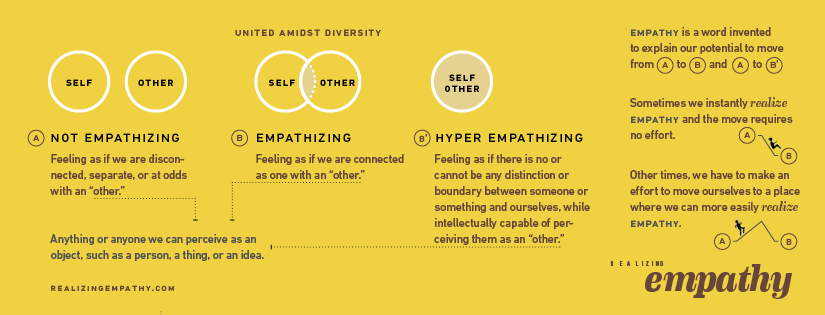Despite sounding
grand,
what if “to overcome”
simply means
to learn the choice
to look back at
—with genuine appreciation—
a past event
we once judged
negatively.
Tag: Appreciation
Vengefulness
Vengefulness
can be
a request.
One saying,
“I want you
to empathize.”
“I want you
to empathize
with what it was like
for me to go through
what I went through.”
“I want my experience
to be appreciated,
respected,
and deemed worthy
of attention.”
“I want my experience
to matter.”
Not About Me
When someone does something
we dislike
we tend to become
self-absorbed.
They hurt
“me.”
They disrespected
“me.”
They don’t appreciate
“me.”
Me.
Me.
Me.
When we realize empathy,
we often see
that the behavior we considered
to be about
“me”
had less to do with
“me”
and more to do with
them
feeling unsupported.
Seeing
When we realize empathy,
we come to see
what we previously
did not.
When we see
the unseen,
we come to know
what we previously
did not.
When we know
the unknown,
we come to comprehend
what we previously
did not.
When we comprehend
the incomprehensible,
we come to appreciate
what we previously
did not.
When we appreciate
the unappreciated,
we come to experience
life
in ways we previously
did not.
Privilege
One way
to discuss privilege
is to focus on the burden of gifts
others
have given us.
Wealth,
Opportunity,
Access…
Another way
to discuss privilege
is to focus on the gifts
we have
to give.
We cannot always force others
to give their gifts
to people
other
than ourselves.
But we can give
our own gifts
to anyone
we choose.
Realizing Empathy
We realize empathy
when we empathize
with someone
or something‒
including ourselves‒
through an unexpected
realization.
One that might makes us go
“Ah ha!”
“Ah…” or
“Ha ha ha!”
concerning something
we either did not
or had incorrectly assumed
to have understood
or appreciated
enough.
Am I Doing Enough?
When it feels
as if we’re not doing enough,
a useful question to ask
can be
“From whom do I need recognition
or validation?”
Often times,
what makes something “enough”
is not what we do,
but knowing how certain people feel
about what we do.
It can sometimes be difficult
to admit
that we need recognition
or validation.
But we all need it
from time to time.
Power Dynamics
It’s tempting
to think of some relationships
as having a unilateral
power dynamic.
As if our parents
have unilateral power
over us.
As if our bosses
have unilateral power
over us.
As if our investors
have unilateral power
over us.
What we inevitably learn
is that we also have power
over our parents,
over our bosses,
over our investors.
Why?
Because they have a vested interest
in our success.
Given this,
we can choose to see these relationships
through the lens of
“They only care about us
because they have a vested interest
in our success!”
or
through the lens of
“I appreciate
that there are people who care about us
enough to have a vested interest
in our success.”
At least two choices
we can learn.
Only one of which
helps us use
power with.
Unshared vs Shared Risk
The risk
lies not merely in the risk,
But also in not sharing
the risk.
To achieve something great,
we often think
we have to take on all the burden
ourselves.
That this
is how we show our care.
That this
is something others
will appreciate.
Yet,
what may be more desired
by those cared for by us
is to belong,
to participate,
to contribute.
So as to take the risk
together.
No matter how great the risk.
No matter how difficult.
Something significant about it changes,
when it is shared together.
Recovering from Betrayal
“I did my best.
I meditated.
I actively listened.
I created psychological safety.
Yet, they still let me down…”
a founder lamented.
…
Once upon a time,
I was cheated on.
Externally,
I was angry.
I thought I had done
my best,
and yet
this had still happened.
Some said,
that to recover
I needed to hear
her regret.
Perhaps.
But I was already overwhelmed
with my own.
“I should’ve done X.”
“I could’ve done Y better .”
“Why didn’t I know
that Z was not enough?”
Because internally,
I was ashamed.
In hindsight,
what I needed
was appreciation.
The kind
that would’ve helped me let go
of the unconscious belief
that I hadn’t actually
“done my best,”
and thus deserved
to be abandoned.
…
There are times,
when we think “doing our best”
means following best practices
as espoused by podcasts
or academic research.
It can.
So long as it also means
accepting we’ve done our best
even if the practices fail.
So long as it also means
learning to grieve
when they fail.
So long as it also means
leveraging the meaning
of them having failed.
All
for the purpose
of recovery.
